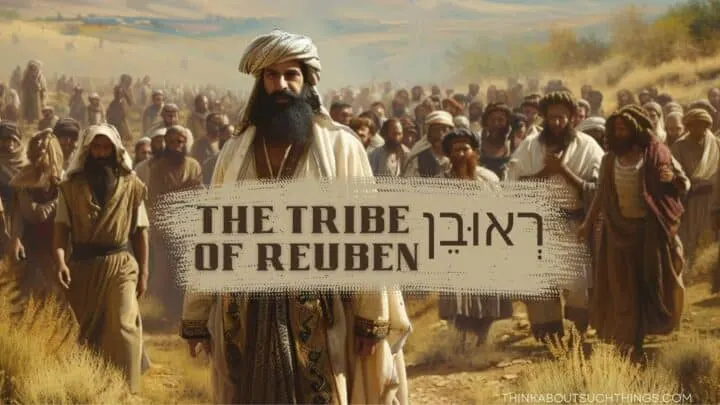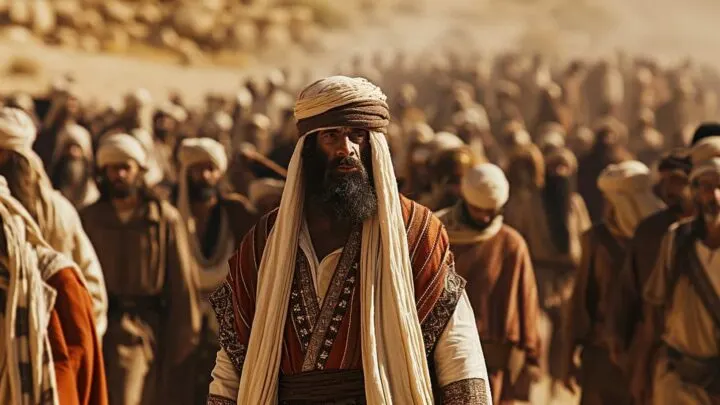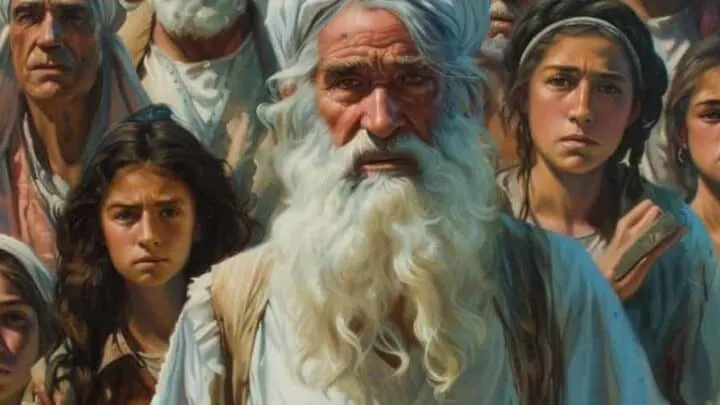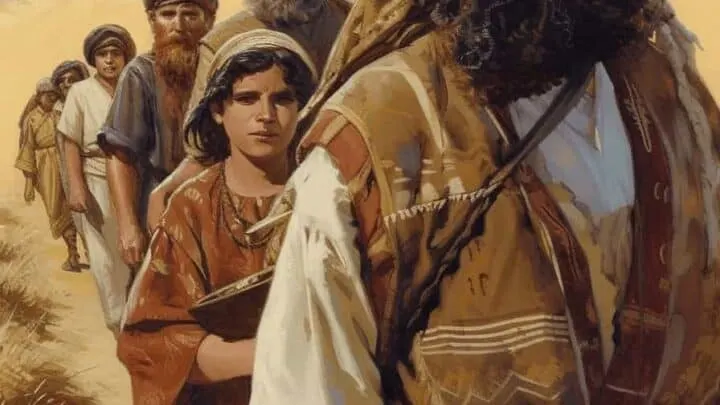When reading the Old or New Testament Bible, we often come across references to the “twelve tribes of Israel.”
Most of us are familiar with the tribe of Judah, which features the royal bloodline of David, from which Jesus himself was a descendant. Some are also familiar with the priestly tribe of Levi but might have wondered about the Tribe of Issachar.
The Tribe of Issachar were the descendants of Jacob’s son, Issachar, his fifth son from his wife Leah. Although they might not have been as prominent as the tribes of Judah or Levi, wisdom, strength, and bravery were among the many laudable traits of the descendants of Issachar.
Before he died, Jacob blessed all his sons. He likened Issachar to a “rawboned donkey” who would “bend his shoulder to the burden and submit to forced labor.” (Genesis 49:14-15)
For most of us, being likened to a donkey submitting to forced labor may not sound like a blessing, but in the history of Israel, Issachar wasn’t only a blessed tribe but also often a blessing to others.
Key Takeaways
• The name Issachar means: “There is wage or reward.”
• Known for their knowledge and wisdom, teaching the law.
• Praised for their bravery in battles, fighting alongside leaders like Deborah and Barak.
• Aided King David in his fight against King Saul.
• Blessed by Jacob as a “strong donkey” willing to work hard.
• Allocated a fertile land area after conquering the Promised Land.
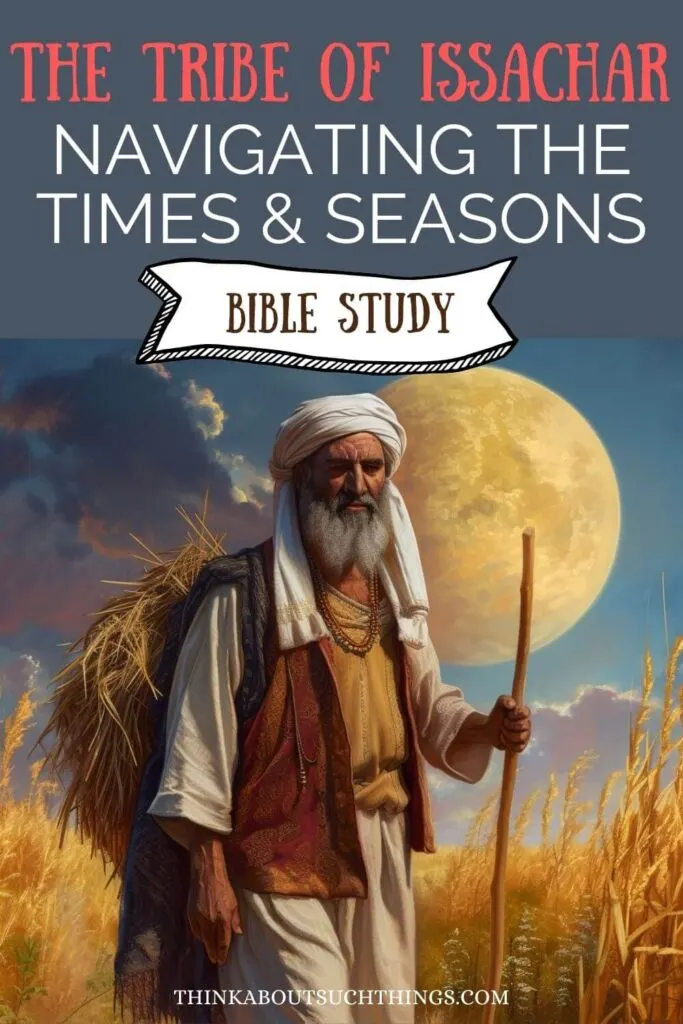
Meaning of the Name Issachar
The name Issachar, also spelled Yis-sakhar (Strong’s number H3485), was made up of two words, “yeysh” (Strong’s number H3426), meaning “there is, “and “sa-khar” (Strong’s number H7939), meaning “wage.”
יִשָּׂשכָר Yissâˢkâr, yis-saw-kawr’; (strictly yis-saws-kawr’); from H5375 and H7939; he will bring a reward; Jissaskar, a son of Jacob:—Issachar.
יֵשׁ yêsh, yaysh; perhaps from an unused root meaning to stand out, or exist; entity; used adverbially or as a copula for the substantive verb (H1961); there is or are (or any other form of the verb to be, as may suit the connection):—(there) are, (he, it, shall, there, there may, there shall, there should) be, thou do, had, hast, (which) hath, (I, shalt, that) have, (he, it, there) is, substance, it (there) was, (there) were, ye will, thou wilt, wouldest.
שָׂכָר sâkâr, saw-kawr’; from H7936; payment of contract; concretely, salary, fare, maintenance; by implication, compensation, benefit:—hire, price, reward(-ed), wages, worth.
Therefore, one could translate Issachar as “there is wage or reward,” corresponding to Genesis 30:18, where Leah said: “God has rewarded me for giving my servant to my husband.”
Issachar was a blessing to his mother, and throughout the history of Israel, we often see how his descendants, the tribe of Issachar, were a blessing to the rest of the Israelites.
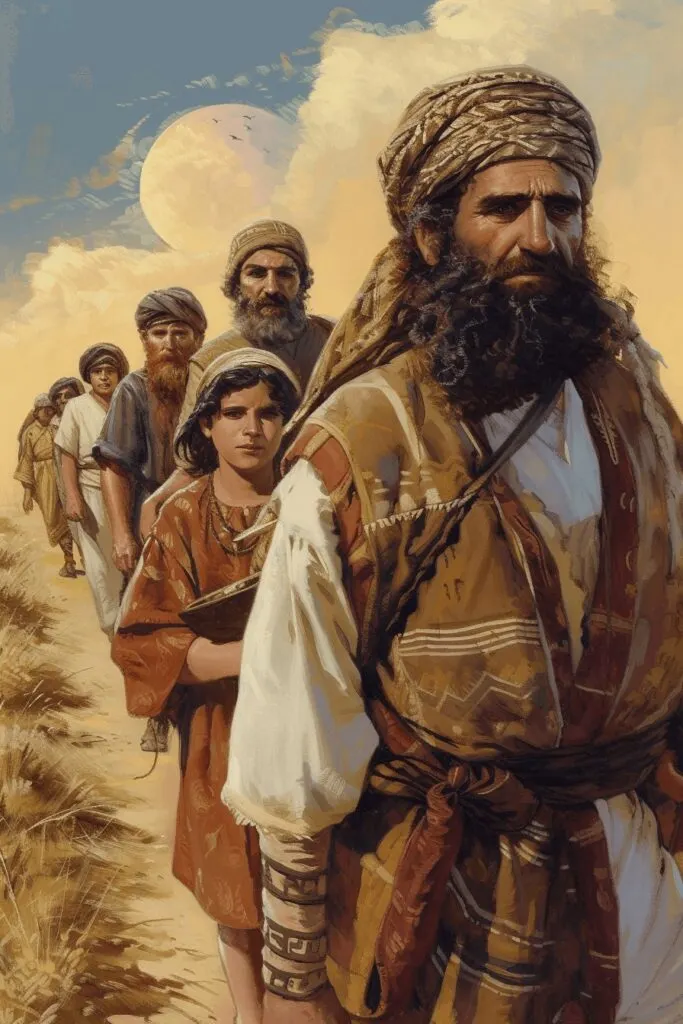
- Teachers of the law – In Jewish literature, the Tribe of Issachar is praised for their knowledge and understanding of the Torah and willingness to share it with others. This willingness to share their knowledge made them some of the earliest teachers of the law.
- Fighting to take the promised land – In Numbers 1, Moses and Aaron performed Israel’s first census, counting the men ready to fight. In Numbers 1:29, we read: “The number from the tribe of Issachar was 54,400.”
- Fighting with Deborah and Barak – In Judges 5:15, we read that the “princes of Issachar were with Deborah; yes, Issachar was with Barak, sent under his command into the valley.”
Under orders from Deborah, Barak attacked and defeated Sisera and the Canaanite army, and the men from Issachar fought with him. - Aiding King David – In 1 Chronicles 12:32-33, we see 200 chiefs from the tribe of Issachar, with all their relatives under them, join David in the fight against King Saul, eventually resulting in David taking over the throne and becoming the king of Israel.
We also see in this passage that the sons of Issachar have a specific anointing or gifting to understand the times and seasons.
As Issachar was a blessing to his mother, a reward from God, so his descendants were a blessing to the people of Israel, not just through sharing their deep knowledge and understanding of the Torah but also through their efforts in war.
The Blessings Of Issachar
In Genesis 49, we read how Jacob called all his sons to give them a blessing. In verses 14-15, he said, “Issachar is a rawboned donkey lying down among the sheep pens.
When he sees how good is his resting place and how pleasant his land, he will bend his shoulder to the burden and submit to forced labor.” (Genesis 49:14-15, NIV)
This piece of scripture may not sound like a blessing. Who would want to be likened to a donkey that would submit to forced labor?
However, considering the varied translations of this same verse in different English versions of the Bible, it becomes clear that translating this blessing accurately may not be quite that simple. Let’s consider a more accurate translation.
- Rawboned – The original Hebrew word used here is gā-rem (Strong’s no 1634). Translated as rawboned in the NIV, a more accurate translation would be “strong.”
- Sheep pens – The Hebrew word used here is ham-miš-pə-ṯā-yim (Strong’s no 4942). A more accurate translation of this word would be “two burdens.”
- Submit to forced labor – The words used in the original text are way-hî (Strong’s no 1961), lə-mas- (Strongs no 4522), and ‘ō-ḇêḏ (Strong’s no 5647), which literally means to “become a band of slaves).
Therefore, a more accurate translation of Genesis 49:14-15 could be:
“Issachar is a strong donkey lying between two burdens. When he sees how good his resting place and pleasant his land is, he will bow his shoulder to take up the burden and become a band of slaves.”
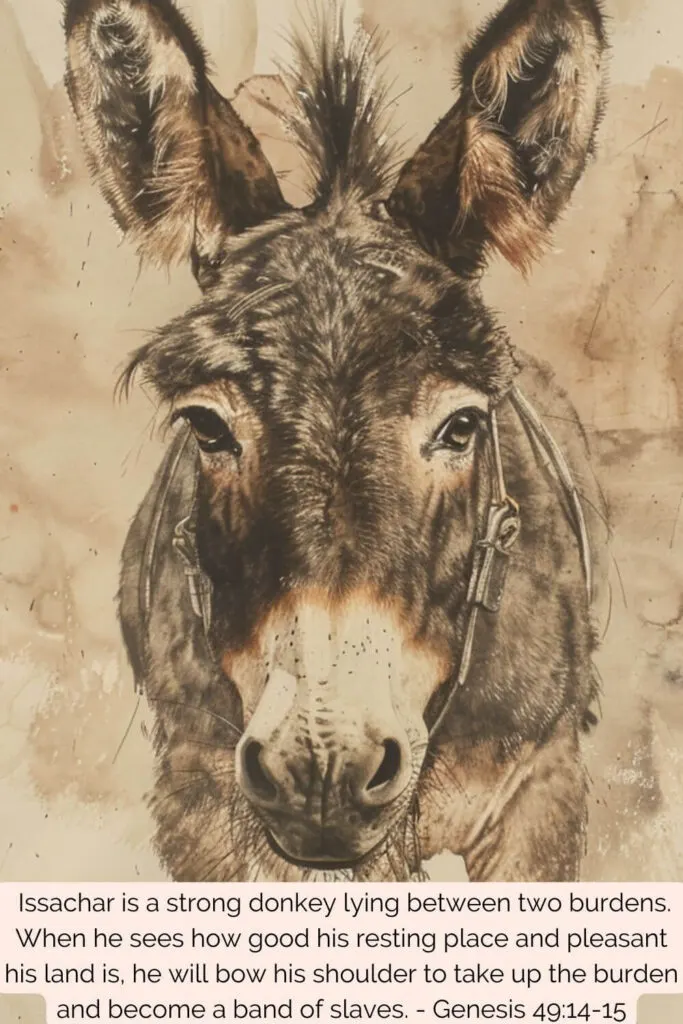
Although the strength of the men of the tribe of Issachar was legendary, there is no historical record of them being slaves, except during the period in Egypt, where they were enslaved, along with all the other tribes of Israel.
Scholars believe the reference to a “band of slaves” in the blessing Issachar received from his father referred to their willingness to work hard.
In Deuteronomy 33:18-19, before they took the promised land, Moses again blessed Issachar with these words:
“Rejoice, Zebulun, in your going out, and you, Issachar, in your tents. They will summon peoples to the mountain and there offer sacrifices of the righteous; they will feast on the abundance of the seas, on the treasures hidden in the sand.”
Moses’ blessing has reference to the tribe of Issachar picking the fruits of their labor in agriculture.
The area allocated to the tribe of Issachar after Israel took the promised land was one of the most fertile areas in all of Israel, where the tribe of Issachar grew crops to feed themselves and the rest of the nation of Israel.
It, therefore, becomes clear that the intention of Jacob’s blessing, his words that Issachar would “become a band of slaves,” instead referred to the fact that they would be hard workers, one of the many good qualities that the people of Issachar possessed.
Here is a chart on the tribe of Ischarra stating their events and contributation to Israel and the stories in the Bible.
| Event/Contribution | Biblical Reference | Description |
|---|---|---|
| Teachers of the Law | Jewish literature | Known for their knowledge of the Torah and willingness to share it, making them early teachers of the law. |
| Fighting to take the Promised Land | Numbers 1:29 | During the census by Moses and Aaron, the tribe of Issachar had 54,400 men ready for battle. |
| Fighting with Deborah and Barak | Judges 5:15 | The princes of Issachar fought alongside Deborah and Barak against the Canaanite army led by Sisera. |
| Aiding King David | 1 Chronicles 12:32-33 | 200 chiefs from Issachar, with their relatives, joined David in his fight against King Saul, helping him become king. |
| Baasha becomes King of Israel | 1 Kings 15:27-28 | Baasha, from the tribe of Issachar, killed King Nadab and became king of Israel, ruling for 24 years. |
| Blessed by Jacob for hard work | Genesis 49:14-15 | Jacob’s blessing likened Issachar to a “strong donkey” willing to bear burdens and work hard. |
| Blessed by Moses for agriculture | Deuteronomy 33:18-19 | Moses blessed Issachar, referring to their tents and the fertile land allocated to them in the Promised Land. |
What Happened To The Tribe Of Issachar?
After the death of Solomon, the people of Israel revolted against the high taxes levied by Solomon and his son, Rehoboam.
The revolt led to a split in the kingdom. The tribe of Judah and a large portion of Benjamin accepted Rehoboam as their king and became known as the kingdom of Judah. Still, all the other tribes, including Issachar, appointed Jeroboam as the king of Israel.
In 1 Kings 15:27, we read how Baasha, from the tribe of Issachar, killed King Nadab to take over his throne. Baasha ruled over Israel for 24 years before he died, and his son, Elah, succeeded him.
Many generations later, in approximately 722 BC, the Assyrians took over the kingdom of Israel and exiled all the people.
The ten tribes of Israel were scattered across the Assyrian empire and eventually lost their identity as tribes or a nation. These ten lost tribes of Israel included the tribe of Issachar.
The descendants of Jacob’s sixth son, Issachar, the tribe of Issachar was highly regarded as strong and brave, highly educated and wise.
The name of Issachar, meaning “there is reward,” was carried forward in how his descendants were a blessing to the people of Israel. The tribe of Issachar was eventually scattered and became one of the lost tribes of Israel.
The Tribes of Israel
Unlock the fascinating histories & profound legacies of the 12 Tribes of Israel in our epic Bible study series! From Reuben's birthright to Levi's priestly roles, Judah's kings to Joseph's prominence - explore in-depth the unique paths, impacts & symbolic meanings of each tribe.
Gain revelatory insights into their conquests, failings, blessings & destinies across this comprehensive journey through Scripture. Prepare to have your understanding of Israel's tribes forever transformed!
The Tribe of Reuben: The Rise and Fall of the Firstborn
Uncover the untold story of Reuben, Jacob's firstborn son & founder of one of the 12 tribes of Israel. Our in-depth Bible study explores Reuben's life, legacy & what went wrong that cost him his birthright. Gain profound insights into this misunderstood tribe's history.
The Tribe of Simeon: The Fierce and Fatal Son
Unravel the mysteries of the often overlooked Tribe of Simeon in our comprehensive Bible study. Explore their conquest of Canaanite cities, dispersal among Judah's territory, and ultimate absorption. Gain eye-opening insights into this tribe's complex history and legacy.
The Tribe of Levi: Set Apart for Service
Discover the sacred legacy of the Tribe of Levi, entrusted as priests & keepers of the tabernacle. Our insightful Bible study unveils their unique role, responsibilities, and how they upheld worship for all Israel. Explore this devoted tribe's profound spiritual impact.
The Tribe of Issachar: Navigating the Times & Seasons
Learn the profound wisdom of the Tribe of Issachar, celebrated for their deep understanding of the Torah. Our enlightening Bible study reveals their role as renowned teachers of the law and brave warriors. Discover the inspiring legacy of this remarkable tribe.

Melissa is a passionate minister, speaker and an ongoing learner of the Bible. She has been involved in church and vocational ministry for over 18 years. And is the founder of Think About Such Things. She has the heart to equip the saints by helping them get into the Word of God and fall more in love with Jesus. She also enjoys family, cooking, and reading.
She has spoken in churches in California, Oregon, Texas, and Mexico and has been featured in Guidepost Magazine and All Recipes Magazine. Read More…

